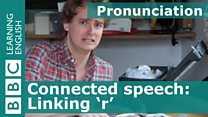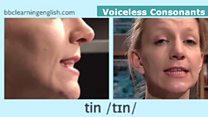Unit 1: Towards advanced
Welcome to our new course
Select a unit
- 1 Towards advanced
- 2 Towards advanced
- 3 Towards advanced
- 4 Towards advanced
- 5 Towards advanced
- 6 Towards advanced
- 7 Towards advanced
- 8 Towards advanced
- 9 Towards Advanced
- 10 Towards Advanced
- 11 Towards Advanced
- 12 Towards Advanced
- 13 Towards Advanced
- 14 Towards Advanced
- 15 Towards Advanced
- 16 Towards Advanced
- 17 Towards Advanced
- 18 Towards Advanced
- 19 Towards Advanced
- 20 Towards Advanced
- 21 Towards Advanced
- 22 Towards Advanced
- 23 Towards Advanced
- 24 Towards Advanced
- 25 Towards Advanced
- 26 Towards Advanced
- 27 Towards Advanced
- 28 Towards Advanced
- 29 Towards Advanced
- 30 Towards Advanced
Session 5
Tim's Pronunciation Workshop: Assimilation
What happens when a word ending with a /t/ sound is followed by a word beginning with a /p/ sound?
Activity 1
Tim's Pronunciation Workshop: Assimilation of /t/ and /p/
A white piece of paper...
Do you want to sound more natural when you speak English? Do you sometimes struggle to understand native speakers' pronunciation? This series is for you!
Every Friday, our very own Tim Gibson will be in the BBC Learning English pronunciation workshop, looking at an aspect of connected speech. This time, he's looking at assimilation, with the help of the Learning English team, some Londoners - and a white piece of paper!
To do
Take a look at the video, then try the activity to do some practice.
Watch the video and complete the activity

Tim
Hi. I'm Tim and this is my Pronunciation workshop. Here I'm going to show you how English is really spoken. It'll help you become a better listener and a more fluent speaker. Come on, let's go inside. Here's a question for you: When is a tea not a tea? Well, this is the answer. What is it? And what colour is it? Let's go to the streets of London to find out.
Voxpops
It's a white piece of paper.
It's a white piece of paper.
That is a white piece of paper.
That's a white piece of paper.
That is a white piece of paper.
Tim
Now the word 'white' ends in the sound /t/ doesn't it? Or does it? Let's have another listen.
Voxpops
It's a white piece of paper.
It's a white piece of paper.
That is a white piece of paper.
That's a white piece of paper.
That is a white piece of paper.
Tim
In fluent speech, if one word ends in a /t/ sound and the next word begins in a /p/ sound, the /t/ is pronounced slightly differently. In fact, we pronounce it as if it were almost a /p/ sound. So 'white piece of paper' becomes 'whi(te) piece of paper'. Let's take another look, this time in slow motion:
Voxpops
whi(te) piece
whi(te) piece
whi(te) piece
whi(te) piece
whi(te) piece of paper
Tim
Interesting, hey? This is an example of how sounds change in everyday speech - and it's called assimilation. Here are some more examples:
Examples
There are lots of grea(t) parks in London.
I love spli(t) pea soup.
I ha(te) potatoes.
My ma(te) picked us up from the airport.
Tim
Right, so, you've heard the examples, and now it's your turn. Are you ready to have a go? Listen and repeat.
Examples
There are lots of great parks in London.
I love split pea soup.
I hate potatoes.
My mate picked us up from the airport.
Tim
How did you get on? Great. If you want to hear more about this topic, please visit our website bbclearningenglish.com. That's about it from the pronunciation workshop this week. Bye bye. Did you just see…? I could have sworn it was… You know, sometimes I think I have a split personality!
Assimilation of /t/ and /p/
When a word ending in a /t/ sound is followed by a word beginning in a /p/ sound, sometimes, the two sounds come together - with the /t/ sound changing to /p/. Some examples of phrases where this might happen include:
A piece of white paper
A split personality
I hate pears
To do
Got that? Now try this activity to get some more practice.
The assimilation game
6 Questions
In this game, each clip has a word ending in a /t/ sound followed by a word beginning with a /p/ sound. But are they assimilated? You decide...
Help
Activity
In this game, each clip has a word ending in a /t/ sound followed by a word beginning with a /p/ sound. But are they assimilated? You decide...
Hint
Can you hear a /t/ sound at the end of 'white'?Question 1 of 6

Help
Activity
In this game, each clip has a word ending in a /t/ sound followed by a word beginning with a /p/ sound. But are they assimilated? You decide...
Hint
Can you hear a /t/ sound at the end of 'split'?Question 2 of 6

Help
Activity
In this game, each clip has a word ending in a /t/ sound followed by a word beginning with a /p/ sound. But are they assimilated? You decide...
Hint
Can you hear a /t/ sound at the end of 'hate'?Question 3 of 6

Help
Activity
In this game, each clip has a word ending in a /t/ sound followed by a word beginning with a /p/ sound. But are they assimilated? You decide...
Hint
Can you hear a /t/ sound at the end of 'great'?Question 4 of 6

Help
Activity
In this game, each clip has a word ending in a /t/ sound followed by a word beginning with a /p/ sound. But are they assimilated? You decide...
Hint
Can you hear a /t/ sound at the end of 'mate'?Question 5 of 6

Help
Activity
In this game, each clip has a word ending in a /t/ sound followed by a word beginning with a /p/ sound. But are they assimilated? You decide...
Hint
Can you hear a /t/ sound at the end of 'quite'?Question 6 of 6

Excellent! Great job! Bad luck! You scored:
End of Unit 1
We hope you enjoyed Tim's first pronunciation workshop, and the first unit of this course. In Unit 2, Dan gives you 5 ways to talk about the future - while Tim uses a famous Russian novel to help you improve your pronunciation. Plus, find out which words are making the headlines in News Review - and don't miss out on LingoHack!
Session Vocabulary
Assimilation of /t/ and /p/
When a word ending in a /t/ sound is followed by a word beginning in a /p/ sound, sometimes, the two sounds come together - with the /t/ sound changing to /p/. Some examples of phrases where this might happen include:- A piece of white paper
- A split personality
- I hate pears


